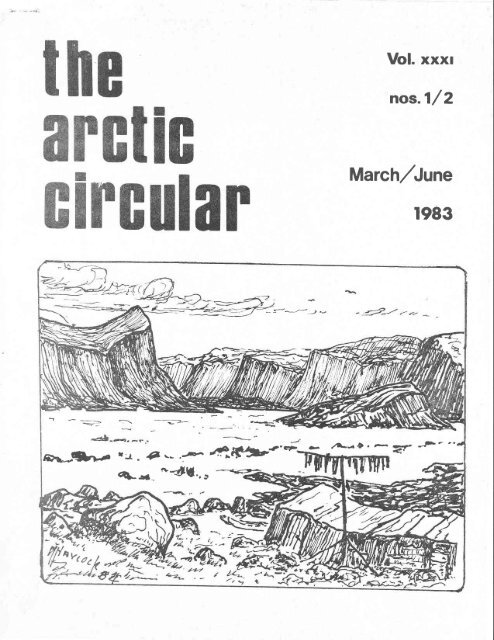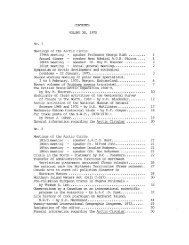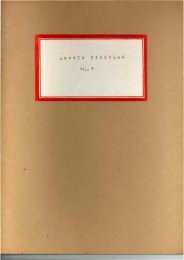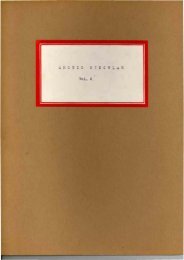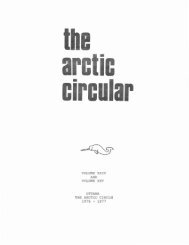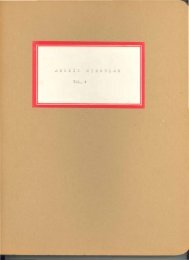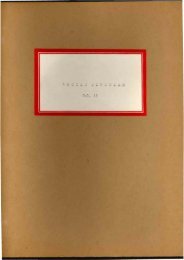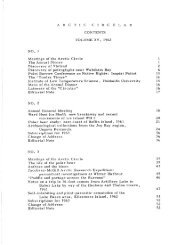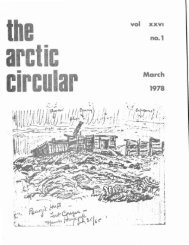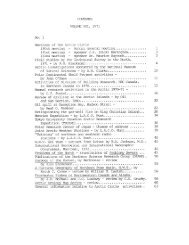Volume 31, 1983 - The Arctic Circle
Volume 31, 1983 - The Arctic Circle
Volume 31, 1983 - The Arctic Circle
Create successful ePaper yourself
Turn your PDF publications into a flip-book with our unique Google optimized e-Paper software.
Vol. xxxr<br />
nos. 1/ 2<br />
March,/,iune<br />
r983<br />
* s-a/-), +<br />
--r --:=,<br />
=\<br />
___+><br />
Fu,qln, r-r. 1\-'- '{?,4$'!>t'+'<br />
e-.1,. t*dU.."<br />
t> /a)'lJD.<br />
-<br />
qao n*- -'<br />
THE ARCTIC CIRCULAR<br />
VOL. XXXI<br />
NOS. 1, 2<br />
Published by the <strong>Arctic</strong> Circ1e<br />
Ottawa, Canada<br />
( r98s )<br />
l"lARCH,/JUNE<br />
<strong>1983</strong><br />
CONTENTS<br />
Cover Picture:<br />
Pangnirtung Fiord,<br />
From the sketchbook<br />
1984.<br />
of Maurice Haycock<br />
Around the CircIe<br />
A Summer in Pangnirtung. By John Bennett<br />
Membership of <strong>The</strong> <strong>Arctic</strong> <strong>Circle</strong><br />
<strong>The</strong> <strong>Arctic</strong> Circular<br />
Correspondence<br />
I<br />
3<br />
22<br />
23<br />
23<br />
ISBN: 004 085X
THE ARCTIC CIRCULAR<br />
VOL. XXXI NOS. T,2<br />
MARCH/JUNE I983<br />
AROUND THE CIRCLE<br />
276th Meetinq, 11 January <strong>1983</strong>. <strong>The</strong> Annual General Meeting<br />
After the conclusion of business an excellent<br />
firm produced by crawley Films was shown. "rn the davs of<br />
the river: boats" is an archival documentary using old<br />
footage dating from the early 1900's to 1935. It shows<br />
the building and work of the river boats on the yukon,<br />
particularly the S.S. KIondike.<br />
277th Meeting, 8 February I9B3<br />
Mr. Sam IvletcaIf e, of the CulturaI and Linguistic<br />
sectron of the Department of rndian Affairs and Northern<br />
Development, spoke on "Inuktitut as a living language".<br />
He dealt wit-h a wide range of issues relating to<br />
rnuktitut, including modern techniques to encourage young<br />
Inuit to develop and maintain a proficiency in the<br />
Ianguage; teaching Inuktitut to southerners as a second<br />
language; the syst-ems that have been established to<br />
modernize and standardize the rnuktitut orthography and<br />
vocabulary, and the charlenges of working in rnuktitut in<br />
a southern, technological, society.<br />
27Bth Meeting, 8 Mar:ch <strong>1983</strong><br />
Dr. R.M. Koerner spoke on "Climatic history<br />
reveared by polar ice cores". He described how crimatic<br />
change over the last 100,000 years could be judged from
THE ARCTIC CIRCULAR<br />
vol,.xxxr, Nos.l,2<br />
deposjtion of dust, po1len, ionsr and metals which are<br />
incorporat.ed in the northern ice sheets. <strong>The</strong> oxygen<br />
isotope ratios and the record of summer melt from ice<br />
layers can also be used as a valuable temperature record.<br />
279th Meeting, 12 ApriI <strong>1983</strong><br />
Professor William Barr,<br />
Saskatchewan, described the work<br />
International Polar Year, August<br />
more detailed comment on the work<br />
in the Canadian <strong>Arctic</strong>.<br />
of the University of<br />
of the First<br />
tB82 to August IBB3, with<br />
of the research stations
VOL.XXXI NOS. L,2<br />
THE ARCTIC C]RCULAR<br />
A Summer in Panqnirtung. By John Bennett 1'<br />
PangnirtuDgr as it slid languidly out from under<br />
the oilstreaked wing of the descending DC-3, seemed<br />
unequal to my apprehensions. A brownish and trivial<br />
smudge on the snow-flecked tundra, the settlement Iooked<br />
like a mot-tled handkerchief which, dropped fluttering from<br />
some passing aircraft, had come to rest outspread on a<br />
tiny beach wedged between the mountains and the ice-choked<br />
fiord. Even on final approach, the eye could in a<br />
twinkling take in its entire area, and the hamlet seemed<br />
to give litt-le cause for the excitement, Iiberally<br />
seasoned with uneasiness, that had kept me from sleep the<br />
night before. Quit.e apart from the normal butterflies<br />
prior to arriving among strangers of a foreign language<br />
and culture, I had been apprehensive beeause an accident<br />
had prevented communication of my plans to the hamlet<br />
council, information which normally precedes the arrival<br />
of a stuclent or researcher in an Inuit community. As the<br />
venerable aircraft touched down and rumbled to a halt my<br />
little anxieties began to return, and when the big cabin<br />
door creaked open on to a chill, drizzly July lst and what<br />
seemed a sea of unfamiliar and scrutinizing faces, the<br />
hamlet no longer appeared insignificant. With every<br />
self-conscious step f took down the rickety stairway<br />
Pangnirtung and its inhabitants grew more imposing.<br />
<strong>The</strong> faint hope I had cherished that some word of<br />
my arrival might have got through and that someone might<br />
actually come to the airstrip to welcome me was soon<br />
extinguished, ds no one spoke to me from the little crowd<br />
of onlookers, which in any case soon dispersed, leaving me<br />
alone. Although it was obvious that my first task would<br />
be to find lodgings, I was uncertain how to proceed.<br />
My decision to come north had been born out of my<br />
enormous interest in the Inuit people, kindled as it was<br />
by my first year of graduate work in Northern and Native<br />
Studies at Carleton University. I felt that until f had<br />
t.<br />
This article was written in January I984. <strong>The</strong> writer<br />
has since spent another five months i.n Pangnirtung. FIe<br />
noted that changes had been made in the decor of the<br />
Coffee Shop, and in the amount of space and number of<br />
coin-operated games in the Pizza Shop.
THE ARCTIC C]RCULAR VOL.XXXI NOS. I,2<br />
gainec'l some experience in the nort-h my work would be of<br />
litt1e value, and while it was obvious to me that in two<br />
months I could expect to achieve hardly more than a<br />
superficial understanding of Inuit Iife in Pangnirtung I<br />
was determined to make at the very least a good start. To<br />
this end I intended to do what I could to live as a member<br />
of the community. I hoped to find lodgings with a family'<br />
to begin learning their language, to spend time out on the<br />
land, and to make friends, especially among those of my<br />
own generation. I was encouraged in this by the support<br />
of Professor Graham Rowley and by Rhoda Innuksuk, then of<br />
the Inuit Committee on National Issues. Rhoda had<br />
suggested to me that investigating the concerns of young<br />
people, who have for a number of years been showing signs<br />
of great social stress, would be a worthwhile study.<br />
While this was the subject that most intrigued me I was<br />
reluctant to engage in a specific research projectr ds<br />
foremost in my mind was the desire to be accepted as much<br />
as possible into the community. Flexibility was<br />
essential, and I was wary of distancing myself from people<br />
by a commitment to the acquisition of a specific body of<br />
informat-ion. Inuit society frowns on the asking of great<br />
streams of questions, and I had no wish to become known as<br />
someone who did. I chose Pangnirtung because of its<br />
proximity to Auyuitt-uq National Park, which I hoped would<br />
a1low me insight into the interaction of local people with<br />
tourists, as well as access to some of the most<br />
spectacular scenery in the Eastern <strong>Arctic</strong>.<br />
On my arrival, however, one question for the<br />
moment eclipsed all others: that was the whereabouts of<br />
the Anglican mission, for it had been suggested to me that<br />
I might possibly stay with one of the ministers in<br />
training there, Joshua Arreak. I spied in the distance a<br />
familiar white flag bearing the Cross of St. George, and<br />
set off toward it. As I walked along the road I would<br />
dearly have loved to appear less conspicuous, for I had<br />
the sensation of not only being watched by the many<br />
children outside playing, but of being peered at<br />
inquirinqly by the very windows of the houses I passed.<br />
Nonetheless f knew it was important that from the start I<br />
be noticed by as many people as possible; and my<br />
unfamiliar face, the large rucksack on my back, and the<br />
violin case under my arm were as effective publicity as<br />
anyone could have desired. It was not long before Kevin,<br />
a boy of about twelve, rode up on his bicycle and asked<br />
what f was looking for. In short order I learned that
VOL.XXXI NOS. T,2<br />
THE ARCTIC CIRCULAR<br />
Joshua Arreak was away in Pond Inlet. I was not<br />
discouraged, as I had been given the name of one other<br />
person with whom I could perhaps stay, Jeannie. When<br />
asked where she might be found neither Kevin nor any of<br />
the several others he asked could be certain. <strong>The</strong><br />
unpleasant notion that both of these contacts would be<br />
unavailable had not occurred to mer and now that it was<br />
reality I felt as if I had been knocked slightly off<br />
balance. To recover my footing f employed the southern<br />
logic I had brought with me: I decided to seek help from<br />
the minister, who would certainly know when Joshua was<br />
expected back, and who might know someone who could put me<br />
up until his return. Had I diligently applied myself to<br />
it, I could not have devised a scheme which would have<br />
more effectively complicated the next twenty-four hours.<br />
I followed Kevin to the pool haII where he<br />
assured me we would find the minister. Inside the little<br />
green building eight or nine elderly men and women crowded<br />
around two billiard tables. More people, some of them<br />
young, sat along the walls observing the tournament, part<br />
of the community's Canada Day celebration. When Kevin<br />
brought over the minister, a dignified looking older man<br />
named Elijah, two adolescent girls came with him, and with<br />
one acting as interpreter I began to explain my situation<br />
to him. He told me that Joshua would not return until the<br />
end of the summer, and after asking me several times what<br />
it was r intended to do in Pangnirtung and why I had<br />
approached him in particular, he said I could stay at his<br />
house if I wished to do so. I hesitated, as I was<br />
uncertain of how I would be perceived if I lived with a<br />
community member with such a clearly defined role as that<br />
of the minister, and f had hoped to live in a household<br />
where there $/ere young people. At the same time I was<br />
afraid that by not accepting I might somehow insult him<br />
and thereby commence my stay by discrediting myself in the<br />
eyes of a prominent and respected member of the<br />
comrnunity. <strong>The</strong> latter fear, combined with a strong desire<br />
to end the suspense over where I would sleep, won out, and<br />
it was with a feeling of relief that I thanked Elijah and<br />
carried my belongings over to the two-storey house flying<br />
the Anglican flag. I then returned to the pool hall to<br />
talk with those I had just met there. No sooner had I<br />
arrived than a young woman I had not seen before<br />
approached and asked without smiling if I would be staying<br />
with her. She introduced herself as Jeannie. I said that<br />
my things were already at the ministerrs house, and
THE ARCTIC CIRCULAR<br />
vol,.xxxr Nos. I,2,<br />
although I did not wish to insult, him I would indeed<br />
prefer to stay with her and her family, if she would agree<br />
to it. I asked whether I might risk insulting the<br />
minister by such a change; her repLy was indistinct and<br />
led me to believe she thoughl no harm would be done. She<br />
walked with me back to the large house where I intended to<br />
fetch my things and carry them to her home. On entering<br />
the little hallway I picked up my backpack and began to<br />
put it orrr at the same time Jeannie pointed to a corner<br />
bedroom and told me I could sleep in there. For a few<br />
seconds my confusion was total. <strong>The</strong>n, in response to my<br />
blank 1ook, Jeannie revealed that she lived in the house<br />
as well, afld that the minister was in fact her father.<br />
She immecliately went outside, and I sat down in bewildered<br />
solitude to contemplate the events of my first three hours<br />
in Pangnirtung.<br />
Around six o'clock the sound of conversation, the<br />
rasping of a television, and the thought of food, which I<br />
ha.d not eaten since early that morning, lured me up the<br />
stairs to the main living area" EIijah, his wife, three<br />
or four teenaged girls, and Jeannie, sat in the large<br />
room. Elijah introduced me to everyone and then began<br />
again to question me, t.his time through Jeannier dS to<br />
what it was that I intended to do in Pangnirtung, and why<br />
it was that. the community had not been notified of my<br />
plans. Once more f replied as clearly as I could, dipping<br />
into my dwindling reserves of calm, for although I was not<br />
being treated unkindly it seemed to me I was being<br />
tolerated rather than welcomed. When EIijah was<br />
satisfied r oy so I thought, and the conversation had<br />
apparently switched to another topic, I remained for a<br />
short while and then went back downstairs as I was<br />
beginning to feel uncomfortable. A half-hour later I<br />
returned, determined to remedy whatever it was that seemed<br />
to be starting my stay off on the wrong foot. No sooner<br />
had I sat down in the one unoccupied spacer orr the sofa<br />
beside EIijah, than he rose abruptly and left the room.<br />
<strong>The</strong> others gradually followed and in the space of five<br />
minutes I was left with only the mocking cylopean regard<br />
of the television for: company. Unnerved at this frank<br />
display of disapproval I left the house and made my way<br />
toward the community ha1I where there was to be a festive<br />
tea in honour of Canada Dav.<br />
***
VOL. XXXI NOS. I ,2<br />
THE ARCTIC CIRCULAR<br />
In contrast to the gloomy scene I had just<br />
escaped, the large single room of the low-roofed<br />
windowless building was alive with merriment. People<br />
Iined the wal1s, seated on groaning benches and talking,<br />
laughing, and drinking tea. In one corner of the haII was<br />
a little stage on which a woman, perched on a stool,<br />
squeezed a lively jig from an accordion. on the floor in<br />
front of her an old man with a twinkle in his eye<br />
improvised a comic dance. His steps and gestures were at<br />
home somewhere between a jig and a drum dance, and the<br />
climax of his act, which occurred over and over, was the<br />
solemn removal of imaginary lice and other normally<br />
inedible material from various parts of his body. He<br />
would then, with a mischievous grin and amid shouts of<br />
laughter and teasing from the crowd, pop the offensive and<br />
non-existent articles into his mouth. Tmmense and<br />
seemingly bottoml-ess boxes of cookies made their way<br />
around the room and f, wedged into place on a bench near<br />
the stage, soon gave in to the infectious gaiety. At<br />
midnight the party showed no signs of slowing down; having<br />
hardly eaten or slept for twenty-four hours, f had<br />
nevertheless run out of energy. But rest was to elude me<br />
for the time beinq.<br />
Soon aft.er I entered Eli jah's house, and was<br />
preparing for bed, a woman who I had not seen before came<br />
downstairs and told me gravely that Elijah and his wife<br />
had been awaiting my return and wished to speak to me, for<br />
it was still not clear to them who or what I was. <strong>The</strong>y<br />
had asked her, their daughter-in-Iaw, to interpret in the<br />
hope that they would at last be able to underst-and what I<br />
intended in Pangnirtung, and why the community had not<br />
been told beforehand. I remember thinkingr zrs I climbed<br />
the stairs, fatigued, and sat down on a varnished chair<br />
opposite the dignified figure of Elijah, that if I were<br />
not thrown out of Pangnirtung by the following day I<br />
should easily qualify for a diplomatic posting on my<br />
eventual return to the south. <strong>The</strong> explanations I gave<br />
werer ds beforer ds simple and direct as I could manage,<br />
although this time it took all my concentration in order<br />
to match the placid aspect of my interrogator, and even so<br />
f doubt that my increasing concern was not perceived by<br />
the others in the room. At the end of half-an-hour the<br />
minister told me that I would have to find other lodgings,<br />
"not because we donrt like you", but because his wife was<br />
not comfortable with a qallunaak, that is, a white person,<br />
who as yet spoke no Inuktitut, living in her house. I was
THE ARCTIC CIRCULAR vol..xxxr Nos. L,2<br />
nonetheless free to spend the night there. <strong>The</strong>y smiled<br />
and thanked me for speaking with them. I thanked them in<br />
return, but the smile on my face as I left the room felt<br />
as if it were made of clay and would surely crack and fatl<br />
away if anyone touched it. Although I could understand<br />
the concerns of the older couple I felt enormously<br />
deflated and was fearful that this episode had wrecked my<br />
chances of establishing good relations with the<br />
cornmunity. <strong>The</strong>re was little else to do for the moment but<br />
lose myself in sleep.<br />
<strong>The</strong> next morning E1ijah appeared at my door and<br />
to my surprise smiled warmly and indicated that breakfast<br />
was ready. While I ate he sat at the table and taught me<br />
some Inuktitut words. f was relieved that he had<br />
apparently regained the friendly manner with which he<br />
first greeted me, and also that I was finalty getting<br />
something to eat. After breakfast I took a walk through<br />
town, uncertain of how to look for a place to stay. f<br />
decided to try to find I{eeka Kilabuk, whose name had been<br />
mentioned to me before my departure, and when I asked a<br />
man for directions he indicated a white and green house<br />
frying a canadian frag. rn front of the door r hesitated<br />
for an instant, not being used to the very pleasant Inuit<br />
custom of not bothering to knock, and then walked in.<br />
<strong>The</strong> sincere and welcoming smile Meeka bestowed on<br />
me instantly set me at ease, and my anxieties rapidly<br />
dissolved in the steaming enamel cup of tea she pressed<br />
into my hand. Why, she asked, hadnrt I come to see her as<br />
soon as r arrived? She had lived in Ottawa and was<br />
familiar with southern ways, and could therefore<br />
understand my situation infinitely better than EIijah,<br />
who, in fact, had visited her several times the previous<br />
day to ask anxiously whether she knew anything about me.<br />
He had no conception of what a university student was, and<br />
his description of me had given her rittre or no clue as<br />
to who or what I might be, although it certainly had<br />
aroused her curiosity. rt had occurred to her that r<br />
courd be a fugitive of some kindr perhaps a draft dodger.<br />
rt was obvious that she could settre these doubts onty uy<br />
talking to me herself, and she had asked Elijah to send me<br />
to see her. Arthough r had not yet received the message,<br />
Meeka had been expecting my visit. She did not hesitate<br />
in gently teasing me for my use of inappropriate garlunaak<br />
1_o91.; the experience r had just been Lhrougtr showed-- the<br />
failure here of a -<br />
course of action that would have been
VOL.XXXI NOS. T,2<br />
THE ARCTIC CIRCULAR<br />
perfectly reasonable in the south. I had taken the<br />
southern model of a small town clergyman and transposed<br />
it. <strong>The</strong> Minister, I had conjectured, having studied<br />
himself and having an intimate knowledge of his<br />
parishioners would not only be able to understand my<br />
situation, but would also be able to assist me in finding<br />
appropriate accommodation. I learned that his experience<br />
was so widely different from my own that try as he might<br />
he could not understand my actions. His knowledge of the<br />
settlement was in addition probabry no better than that of<br />
anyone else, as Meeka told me could have approached<br />
almost any person for the aid I desired. Elijah, though a<br />
kindly man, was not one of the best people in the<br />
community to have approached first, and by doing so f had<br />
caused him needless concern and briefly, but thoroughly,<br />
unnerved myself.<br />
Thanks to the kindness and keen judgement of<br />
Meeka, who asked Peteroosie eappik to consider taking me<br />
in, r spent the summer riving and traverring with a farnily<br />
in whose company I soon ceased feeling like a stranger. I<br />
had scarcely moved into the house when Silasie, a young<br />
man of about my own age and the fourth of peteroosie's ten<br />
children, strode smiling into my room and introduced<br />
himself. He noticed my violin case and told me he played<br />
the guitar. Within the hour we had put the two together,<br />
and that afternoon was born a friendship and musical<br />
partnership that was not only extremely gratifying to me<br />
in a personal sense, but which meant that the two of us<br />
came to be sought after as visitors to many houses and<br />
tents and as players at community gatherings. rndeedr orr<br />
my second eveningr in Pangnirtung I found myself on stage<br />
in the community haI1 staring uncertainty past a jutting<br />
microphone into a blur of expectant faces, all waiting to<br />
hear some toe-tapping music frorn the only fiddler in<br />
town. <strong>The</strong> rnuktitut word for violin is almost identical<br />
to that for file, and the state of my nerves on that<br />
occasion was such that r believe the sound produced would<br />
have been little different had r been playing on the tool<br />
or the instrument.<br />
That gathering, although it took place on JuIy 2<br />
was also part of the Canada Day celebrations, and the<br />
richness of Pangnirtung society was evident from the many<br />
musicians and impromptu comedians who came forward to<br />
perform. one rnaster mimic was a man narned phitipoosie,<br />
whose antics often had me laughing as hard as anyone else
t0 THE ARCTIC CIRCULAR vo],.xxxr Nos. L,2<br />
despite my almost totaL ignorance of the language and the<br />
fact, that some of the jokes were clearly made at my<br />
expense as the only q+llynaak in the hall.<br />
Leaning against the waIl near where I sat was a<br />
group of about six teenagers. One in particular caught my<br />
attention, a girl of about fifteen whom I saw a few days<br />
later manipulating a Rubik Cube at breakneck speed. On<br />
this first occasion she was wearing a Walkman-type<br />
portable tape player with headphones, to which she<br />
appeared to be listening with total absorption, She<br />
leaned over and in a flat tone, which to me indicated she<br />
fully expected a negative response, asked if I were<br />
enjoying myself. When I said yes she replied that she was<br />
not, and that the recorded music was "much better" than<br />
the live entertainment in the hall. While her comment was<br />
no more than an expression of her personal taste, it was<br />
nevertheless a significant reflection coming as it did<br />
from a member of the first complete generation of Inuit to<br />
be born and raised in a settlernent.<br />
RadicalIy different from a corresponding day in<br />
the adolescence of a member of the preceding generation in<br />
whose outpost camp life, hunting, fishing, and trapping<br />
were of primary importance, a sunmer day in town for a<br />
Pangnirtung teenager might run something as follows:<br />
having been out late the previous night he wakes up around<br />
noon or a little later and stays in bed for another halfhour<br />
or so listening to music on a tape player. His<br />
familyts house is one of the newer ones, cedar-sided and<br />
semi-detached, with forced-air heating and hot and cold<br />
running water. He takes a shower and goes downstairs to<br />
the kitchen. During breakfast, CBC North Televisionr €rrr<br />
almost constant presence in the house, is displaying the<br />
carefully concocted mixture of melodrama and hysteria<br />
which is the American television soap opera "All My<br />
children". Another teenager ries on the floor three feet<br />
from the screen, the picture of concentration. In a<br />
rittle while he leaves the house and walks up the hirr to<br />
the Hudsonrs Bay Company store where there is a good<br />
chance of meeting friends, either talking on the landing<br />
outside or strolling up and down the aisles. He stays<br />
there for a time, and before leaving buys a candy bar and<br />
cigarettes, then warks with friends the quarter-mi1e to<br />
the Pangnirtung co-op. <strong>The</strong>re he meets more friends, has a<br />
cup of coffee, and has a look at the shelves of carvings<br />
and ivory jewellery to see if any nevr items have
vol,.xxxr Nos, L,2<br />
THE ARCTIC CIRCULAR<br />
I1<br />
appeared. <strong>The</strong> late afternoon might see him at home or at<br />
a friendrs place listening to music or watching<br />
television, dt this time showing half-hour situation<br />
comedies, such as "Threers Company". <strong>The</strong> evening might<br />
start at Pang Ptzza which, despite the size of its red and<br />
white sign visible from the airstrip, is a tiny stand-up<br />
counter where one can buy pizzas and other fast food.<br />
Video movies are also available for rent there. As there<br />
is no place to sit, Pang Pizza is not suitable for<br />
lingering if the teenager is not interested in playing the<br />
single video game, he might stroll over to the coffee<br />
shop. AIso known as Peter's Place, this is a popular spot<br />
for teenagers to congregate, and offers fast food, about<br />
six video games, and recorded music. <strong>The</strong> floor area is<br />
about the same as that of a local house of medium size,<br />
the tables sport red chequered oilcloths, and IIollywood<br />
beauty queens in bathing suits flash glossy smiles from<br />
coloured posters adorning the wa1ls. Peter's pface is run<br />
entirely by young people, and this helps to create an<br />
atmosphere in which they obviously feel at easer ds many<br />
spend entire evenings there, talking, playing video games<br />
or cards, against a background of steady rock beats pumped<br />
out by the jukebox.<br />
During the summer months the young people hold<br />
dances on Wednesday and Friday nights, the music being<br />
whichever of the latest songs the disc jockey can 1ay his<br />
hands on. In JuIy a visiting group of army cadets from<br />
the south brought with them an eclectic selection of<br />
cassette tapes which included some German rock'n ro11.<br />
<strong>The</strong>se were not only played at every dance, but copies<br />
found their way into many of the houses and tents f<br />
visited. <strong>The</strong> dances were not religiously attended by alI<br />
teenagers but a sizeable core of regulars meant that the<br />
music never played to an empty house; often the little<br />
haII, dimly lit by a single lamp covered by an orange<br />
plastic bag, would be packed fuII, the dull booming of the<br />
bass audible many houses away until well into the next<br />
morning. <strong>The</strong> best dances, according to two young friends<br />
of mine, were those attended by the army cadets, who as<br />
part of an arctic indoctrination course spent several<br />
weeks camped half-a-mile from town. <strong>The</strong> boisterous<br />
presence of these young men and women was to some a<br />
wercome change from the array of famiriar faces seen week<br />
in and week out at the dances. Nevertheless these<br />
newcomers remained relatively detached from the rocal<br />
youthr ds each group, made up of those who knew each other
L2 THE ARCTIC CIRCULAR VOL.XXXI NOS. T,2<br />
quite well, was naturatly shy of the other. One evening a<br />
female cadet from Quebec, obviously outgoing and wishing<br />
to bridge the 9ap, approached a group of local males,<br />
introduced herself, and attempted to start a<br />
conversation. <strong>The</strong> mumbled response was indistinct enough<br />
to cause her to apologize for her heavily accented<br />
English, and to ask the young men if they indeed spoke the<br />
language, to which one replied in a joking tone that they<br />
did not. This extinguished the remaining courage of the<br />
young cadet, who smiled nervously and returned to her<br />
cluster of green-cIad comrades standing near the opposite<br />
waII. <strong>The</strong> manner of the cadets was always noisy and<br />
rambunctious, in stark contrast to the very reserved<br />
demeanour of the local youth, and this did nothing to<br />
endear one group to the other. <strong>The</strong>re was nonetheless some<br />
interaction between them at dances and for the duration of<br />
its stay the cadet camp was a stop for some local young<br />
people on their daity circuits through the community. <strong>The</strong><br />
cadets always left the dances at a fixed hour, and at this<br />
time the community hall emptied as those within poured out<br />
in order to watch the company's spectacular<br />
transformation, dt the hoarse but strenuous urging of the<br />
moustached commanding officer, into an orderly double<br />
cofumn. <strong>The</strong> ensuing parade, somehow ridiculous in this<br />
context, moved eastward through the length of the<br />
community to the campsite on a damp piece of ground,<br />
halfway between the squat cylindrical sentries of the fuel<br />
storage depot and the tickertape wastes of the settlement<br />
dump. <strong>The</strong> dance would then resume, and continue until<br />
about three in the morning, when someone would turn on the<br />
main lights and the occupants, blinking at the sudden<br />
brightness and still charged with the energy of the music,<br />
would spill- out into the dusk and the cool air. Many<br />
would pass the next hour or more walking slowly through<br />
town, from one end to the other and back.<br />
This agreeable end to an evening spent sweating<br />
in the haIlrs smoke-ridden confines was sometimes<br />
characterized by a peculiar tension in the air which I can<br />
only describe as intense anticipation. I experienced this<br />
myself several times, particularly on one occasion while<br />
walking with two friends, when I am certain the three of<br />
us felt similarlyr ds if some unknown and dramatic event<br />
was about to occurt yet we were equally aware, as we<br />
strode along the dark and familiar road, that the events<br />
of this night., if left to themselves, would probably be no<br />
different from those of.any other. As we passed the<br />
school the tension broke. One friend scooped up a pile of
VOL.XXXI NOS. T,2<br />
THE ARCTIC CIRCULAR<br />
I3<br />
rocks and hurled them at the flat expanse of aluminiumclad<br />
wall, where they resounded on impact in a staccato of<br />
metallic crashes. We ran ahead to the hamlet garage to<br />
see which of the trucks and earth-moving machinery parked<br />
there had been left unlocked. Although we had no<br />
intention of inflicting any damage the mood of that<br />
evening gave me insight into the kind of tension which<br />
could find release in petty crime.<br />
I was to be given the opportunity to experience<br />
first-hand another kind of tension, and one not limited to<br />
young people. <strong>The</strong> Qappik family was involved in the<br />
operation of a summer fishing camp where I spent several<br />
weeks. This camp, a cluster of nine small plywood cabins<br />
and a canvas-topped cookhouse, is located at Tongaitr drr<br />
inlet off Kingnait Fiord, about twenty miles from<br />
Pangnirtung by boat. <strong>The</strong> inlet forms the end of a huge<br />
boulder-strewn U-shaped vaIley, and nestled in the valley<br />
floor is a shallow river whose mouth in July and most of<br />
August is packed with arctic char at high tide. <strong>The</strong>se<br />
fish attract tourists from southern Canada, the United<br />
States, and Europe, who gladly spend large sums of money<br />
for three or four days sport.<br />
For the I9B3 season, Tongait Fish camp had been<br />
contracted to Austin Airways of Timmins, Ontario, who, as<br />
partial payment, were scheduled to fly in four<br />
prefabricated cabins, a large propane range and ovenr €rn<br />
extra outhouse, and a supply of furnishings and other<br />
equipment. <strong>The</strong>se arrived on the same plane as the first<br />
tourists, and therefore a large convoy of boats was needed<br />
for the first trip in to the camp. Peteroosie, whose<br />
brother ran Tongait in partnership with another man, had<br />
been hired as a carpenter to help assemble the cabins and<br />
as an outfitter to transport tourists to and from camp.<br />
As a temporary member of his family I was one of the men<br />
from the community who went along to load and unload the<br />
equipment. <strong>The</strong> scanty information given me, combined with<br />
my exaggerated reluctance to ask too many questions, had<br />
given birth to the erroneous notion that the entire fish<br />
camp consisted of the material I was about to help load on<br />
to the freighter canoes, and that it was going to be<br />
assembled, used for three days by the airline president<br />
and his friends, and then disassembled and flown home.<br />
This mythical notion was to me a flagrant example of<br />
unadulterated big-shotism, and as I struggled to the boats
1A THE ARCTIC CIRCULAR VOL.XXXI NOS. L,2<br />
with the stacks of two-by-fours, the awkward sheets of<br />
plywood that caught the wind, and case upon clinking case<br />
of beerr my attitude toward the new arrivals, who on top<br />
of everything insisted that the work be done at a feverish<br />
pace, was l.ess than cordial. For the moment I preferred<br />
to avoid having to speak to them. <strong>The</strong> result of this<br />
bristling j l.f humour extended beyond the bounds of its<br />
original and rather egoistic purpose and gave me direct<br />
insight into the attitudes of some tourists toward their<br />
rnuit hosts. As f never spoke to them, nor to the white<br />
lodge employees who had driven the truckload of supplies<br />
to the water's edge, the newcomers assumed that I too was<br />
an Inuk, a mistake no doubt encouraged by my sun-darkened<br />
skin and dark eyes. I noticed that they seemed<br />
uncomfortable with the Inuit, and spoke to them in an<br />
overly simple fashionr dS one might address someone of<br />
very limited intelligence. At the same time they appeared<br />
quite concerned with establishing some manner of good<br />
relations, which after their fashion meant such gestures<br />
as presenting coins to children. Of the local people<br />
setting up the camp, Peteroosie was one of the oldest and<br />
most dignified; he is highly respected in the community.<br />
1n addition to being an experienced hunter and expert<br />
boatman he is a skilled carpenter and boat builder, and<br />
was also the mayor of Pangnirtung for more than five<br />
years. To me he was like a father while I stayed in his<br />
household, and he demonstrated great patience in teaching<br />
me Tnuktitut as weII as a singular knack for grasping the<br />
intent of my usually garbled attempts at communication.<br />
Working in conjunction with the Europeans he nonetheless<br />
assumed a cJearly subordinate role and accepted, dt least<br />
on the exterior, being ordered about and spoken to in<br />
pidgin. At one point a particularly obnoxious individual'<br />
at least twenty years his junior, attempted to get his<br />
attention by making a "pssst" noise. To this Peteroosie<br />
responded with no outward sign of offence, and it seemed<br />
he was accustomed to being treated in this way by certain<br />
southerners who saw not the dignity of the man but instead<br />
a native who in their interpretation was to be shown what<br />
to do. As for myself f was spoken to in the same wdy,<br />
slowly, with clear enunciation, and pointing at objects<br />
referred to where possibl-e.<br />
At Silasie's urging I had brought my fiddle to<br />
Tongait, and he and I would often play a little distance<br />
from the camp late in the evening, and sometimes for the<br />
entire night. On one such occasion several fishermen, who
vol,.xxxr Nos. 1,2<br />
THE ARCTIC CIRCULAR<br />
t5<br />
had spent the evening drinking and who now were trying<br />
some early morning angling, heard the music and ambled<br />
over to where we were playing, in the lee of a large<br />
boulder facing the yawning, sunspeckred sweep of the huge<br />
valley. <strong>The</strong>y stopped directly in front of us and stood<br />
there, beaming beeriry and snapping photographs. one tol-d<br />
usr slowly and in a voice that oozed sincerity, how<br />
wonderfur it was that we made music. <strong>The</strong> implication was<br />
clearry that we shourd each receive at the very reast a<br />
pat on the head for our efforts, but the man contented<br />
himself with patting me on the knee and did not, as it had<br />
seemed he might, attempt to press a shiny new quarter into<br />
my palm.<br />
Di:inking clearly ranked a cfose second to sport<br />
fishing as a pastime among a significant portion of<br />
visitors. Tongait l-ies just outside the fifteen-mile<br />
radius around Pangnirtung declared alcohor-free by a rgTj<br />
community liquor plebiscite; as the fishermen bring in<br />
large quantities the camp is seen as something of an oasis<br />
by certain local peopre who rike to drink. Austin Airways<br />
wished its clients to have the liberty to drink their filt<br />
but apparently feared any disruption of camp routine that<br />
might result from alcohol use among camp employees. <strong>The</strong><br />
company, therefore, attempted to discourage any offerrng<br />
of afcohol to rnuit working at the camp. This meant that<br />
fishermen were free to teeier about with glass or bottle<br />
in hand but the rest, Iike juveniles, were forbidden a<br />
single drop. It was obvious that this uncomfortable<br />
situation coul-d not last long and it indeed crumbred<br />
within forty-eight hours when an unsuccessfur fisherman,<br />
whose search for solace had brought him within several<br />
gurps of the bottom of a rum bottre, offered, in exchange<br />
for a fish, a can of beer to the young man who quietly<br />
herped him to his cabin from the water's edge where he had<br />
fal-1en down. <strong>The</strong> fisherman had pleaded that none of his<br />
feflows be tord. This event marked the beginning of a<br />
series of thefts by a few young men of beer from the<br />
coolers the fishermen kept outside their cabins. f<br />
suspect that those responsibre for the pirfering, which<br />
recurred periodicarry throughout the summerr s6rw it as<br />
justifiable given the circumstances. Bootleg atcohol made<br />
its way into the rnuit camp from time to time through<br />
local people with contacts in Frobisher Bay. When<br />
supplies were expected from pangnirtung, heralding a<br />
drinking party that eveninq, the air would by late<br />
afternoon grow electric with anticipation. orinking was a
15 THE ARCTIC CIRCULAR VOL.XXXI NOS. I,2<br />
recreation in itself, and although usually done out of<br />
sight of the tourists, certain people would sometimes, and<br />
with various degrees of success, attempt to ingratiate<br />
themselves with the fishermenr in hopes that the latter<br />
would feel obligated to give them alcohol. I had twice<br />
become a player in t"his scheme before I realized what was<br />
happening.<br />
One evening when I was still shy about my role as<br />
a fiddler I was outside playing for a group of Inuit who<br />
had made it prain they wanted some music. within minutes<br />
of the first note the entire tourist population of the<br />
camp, about thirty-five doctors and dentists on an exotic<br />
three-day business management course, and reverlers arr,<br />
arri.ved on the scene with drinks in hand determined to<br />
join, with much hooting and stomping, what they mistook<br />
for a square dance. Looking around for dance partners,<br />
and quite understandably finding nothing suitable from<br />
within thei r own ranks, they pounced on the three rnuit<br />
women present, who sat immobile and stony-faced. As this<br />
unwelcome intrusion shattered the former atmosphere of<br />
quiet content, f immediately lost any desire to play. I<br />
found myself in an awkward position, for if r obliged the<br />
fishermen and the sore rnuk who was actively encouraging<br />
ITr€r a man whose wishes r usuarly tried to respect, r would<br />
simpJ-y excite them further and cause even more irritation,<br />
especiarry to the women. r nevertheless succumbed, to the<br />
pressure of the expectant faces, hoping that when I<br />
exhausted my scanty repertoire the crowd would disperse.<br />
<strong>The</strong> onry rnuk who made any show of enthusiasm and who took<br />
part, albeit halfheartedly, in the ensuing clumsy<br />
jubilation was the individual mentioned. This man<br />
frequently asked silasie and me to pray for the tourists,<br />
who were always game, and as we departed, thirsty, from a<br />
particurarly long concert in a cabin that smelled of<br />
whiskey he pointed over his shoulder at the rittfe plvwood<br />
structure and referred to those within as less than<br />
perfect hosts. r realized that his hope of getting drink<br />
a<br />
was the main reason he had encouiaged,r" to fray.<br />
Most of the few times I saw openly expressed<br />
anger among people, and the only times at Tongait,<br />
occurred when they had been drinking, and thil usuarly<br />
among the young people. r noticed that when shouting at<br />
eaeh other they almost invariably used English, perhips<br />
finding its rich.profanity bettei suited to the.*pr.ision<br />
of rage than their own ranguage. <strong>The</strong> normal atmos-phere
VOL.XXXI NOS. L,2 THE ARCTIC CIRCULAR I7<br />
inside a large family tent was one of communal warmth and<br />
peace, punctuated by cups of tea and bites of pilot<br />
biscuits or bannock. <strong>The</strong>se also formed the standby diet<br />
when out hunting, until fresh meat was available. I<br />
subsisted on it many times, the most memorable of those<br />
being the whale hunt in August.<br />
As the Beluga population has not recovered from<br />
pre-war commercial fishing, the hunting of this small<br />
whale is restricted by an annual quota. <strong>The</strong> hunters vierv<br />
the approach of the semi-annual beluga hunt with intense<br />
anticipation. Coupled with the excitement of hunting<br />
these intelligent animals, is the promise of fresh whale<br />
skin (maktak) and dried whale meat both now scarce in<br />
Pangnirtung. <strong>The</strong> summer months see the belugas at the<br />
head of Cumberland Sound in Clearwater Fiord which, odd1y,<br />
has some of the siltiest water in the area, about sixty<br />
miles by boat from Pangnirtung. <strong>The</strong> August hunt this year<br />
opened on a Saturday morning, and closed the same<br />
afternoon when the federal fisheries staff on site felt<br />
the quota of twenty-three whales had been reached.<br />
I accompanied Peteroosie and his son Silasie in<br />
their motorboat. We arrived on Thursday evening after a<br />
three-hour boat trip, during which Peteroosie had again<br />
impressed me with his unerring navigation through<br />
treacherous tidal channels and thick fog which often<br />
entirely obscured the land. Already a number of hunters<br />
had arrived at the Clearwater camp. Accordion music<br />
drifted through the night air, arctic char hung drying<br />
outside some of the tents, and the still warm carcass of a<br />
freshly killed caribou awaited us on the deck of a<br />
diesel-powered Peterhead, which several hunters had<br />
chartered. That night we slept in Peteroosie's motorboat<br />
under an old piece of tent fitted to a homemade frame,<br />
providing a secure, rf a litt1e leaky, shelter from the<br />
fine drizzle and raw air. <strong>The</strong> next day the hunters spent<br />
relaxing and anticipating the joy of the hunt, while stiIl<br />
more canoes and another Peterhead appeared in the fiord.<br />
By late afternoon there were at least forty small boats,<br />
many with two hunters on board, and the two large craft<br />
each with five or six.<br />
Department of Fisheries and Oceans biologists<br />
spent the sufirmer at the Clearwater camp studying the<br />
had
I6 THE ARCTIC CIRCULAR vol,.xxxr Nos. L,2<br />
habits of the belugas and were responsible for ensuring<br />
that the quota was not exceeded. To this end they met<br />
with the hunters at two p.m. on Friday to remind them of<br />
the limit of twenty-three whales and to find out what plan<br />
the hunters had made for respecting it. <strong>The</strong> fnuitr or the<br />
other hand, were curious to learn what method the<br />
biologists had devised to ensure that the quota not be<br />
exceeded. What followed was a predictably circular and at<br />
times heated discussion during which each side accused the<br />
other of having failed in its responsibility to develop a<br />
workable system. <strong>The</strong> Inuit said that they respected the<br />
l-aw but felt it was unfair to attempt to resolve such a<br />
major issue in a last minute discussion. More reasonable<br />
and considerate action would have been a meeting in the<br />
hamlet several months before the hunt, dt which both sides<br />
could have worked out an acceptable method of meeting the<br />
quota. With the hunt less than twelve hours away, it was<br />
imperative that a makeshift plan be developed. Foremost<br />
in the minds of the hunters was the question of how they<br />
would know when the allocated number of whales had been<br />
killed, and what penalty would be imposed on a hunter who<br />
killed an extra whale. One of the officials doggedly<br />
maintained that anyone found exceeding the limit would be<br />
punished to the full extent of the law. With no effective<br />
method for the handful of biologists and the two RCMP<br />
officers to keep watch over the several foggy miles of<br />
fiord this was recognized as the bluff that it was. <strong>The</strong><br />
sides eventually agreed on one hunter's suggestion that<br />
the Government staff set off smoke flares when they<br />
estimated that twenty-three whales had been killed. One<br />
watcher would be stationed on a high cliff with pair of<br />
binoculars, and the remainder would patrol from a Zodiac<br />
and the RCMP canoe. <strong>The</strong> biologists also wished to have<br />
the measurements of every whale killed, and to take organ<br />
samples frorn each. <strong>The</strong> meeting closed with a word of<br />
caution from the biologists on the use of firearms,<br />
prtzzling coming as it did from men who were toddlers when<br />
the majority of the hunters present were learning to use<br />
rifles.<br />
<strong>The</strong> fnuit passed the remainder of the day and the<br />
entire night talking, making musict ot playing cards, some<br />
playing for bullets, by the bright yellow glow of sibilant<br />
coleman lanterns in the tents and boats. At around three<br />
the next morning the tentative halflight of dawn reveared<br />
once again a misty and tranquil world where the<br />
fog-softened lines of land, sky, and sea merged into a
vol,. xxxr Nos. L ,2<br />
THE ARCTIC CIRCULAR<br />
I9<br />
gloomy pastel painted in shades of grey. From time to<br />
time the deep hissing sighs of surfacing belugas cut the<br />
still air, the arc of their smooth white backs highly<br />
visible against the gun-metal water.<br />
No tirne was lost in taking down the boat cover<br />
and stowing the gear, loading the heavy calibre rifles and<br />
readying the harpoon and line. In short order we raised<br />
anchor, coaxed the unwilling twin outboards into life, and<br />
set off toward the head of the fiord. Peteroosie and<br />
Silasie, at once relaxed and intently observant, leaned<br />
against the deck and scrutinized the water. Within ten<br />
minutes Peteroosie had sighted a whale at a distance; a<br />
burst of speed brought the boat within shooting range. He<br />
and Silasie each fired one shot into the animal's side,<br />
whereupon the whale cut short its breath and disappeared<br />
beneath the waves. At this point the hunter must attempt<br />
to guess where the whale will reappear. Belugas are<br />
clever and will often choose a spot behind the boat and<br />
far out of range. When the hunter again sights the<br />
animal, he makes for it at top speed. If he decides he<br />
cannot get close enough before it dives again he fires a<br />
round into the air to frighten it down, thereby reducing<br />
its breathing time and forcing it to resurface prematurely<br />
and not too far away. A wounded whale spends as litt1e<br />
time exposed as possible, exhaling underwater and sending<br />
great streams of bubbles to the surface. As our whale<br />
surfaced Silasie fired hitting the whale, which jerked its<br />
tail in pain, and became noticeably weaker and its<br />
movements more sluggish. Blood and blubber mixed with the<br />
exhaled breath, reddening the water and leaving an oily<br />
film on the surface. Eventually, when it could hardly<br />
muster the strength to dive, Peteroosie brought our boat<br />
alongside and hurled his harpoon into the enraged animal,<br />
which flapped about on the end of the line like a huge<br />
hooked fish. A final shot to the head dispatched it and<br />
the whale lay still on the surface.<br />
As this hunt was overcrowded two or three boats<br />
would pursue each whale r dnd for nine hours a furious<br />
rattling of gunfire echoed and re-echoed down the length<br />
of the fiord with the ferocj-ty of a small naval battle.<br />
Silasie said it was like a war on whales. At around noon<br />
three puffs of white smoke from flares operated by the<br />
officials signalled the end of the hunt and the clamour<br />
gradually ceased as those pursuing a wounded whale<br />
finished off their quarry.<br />
***
20 THE ARCTIC CIRCULAR vol,. xxxl Nos. L ,2<br />
<strong>The</strong> confusion surrounding both the imposition of<br />
a wharing quota and the regurations for the hunt on the<br />
hunters of Pangnirtung is an example of the disruption and<br />
uncertainty that rapid ehanger so typical of life in the<br />
north, can cause. Fundamental alterations in the<br />
character of Pangnirtung itself over the past twenty<br />
years, and subtle ones ove{rthe past five or sor were<br />
recurring themes in discusdlons with Inuit of my own<br />
generation. One evening f had a long talk with Johnny<br />
Mike, a twenty-eight year-o1d, with a wife and two<br />
children, who was working as a mechanic for the hamlet.<br />
His mind, he told me, still reels from the changes he has<br />
seen. When he reminisced about his childhood living in a<br />
qammaq, a wood-framed structure with a canvas covering,<br />
and recalled the days before snowmobiles it occurred to me<br />
that in my own society I would expect to hear similar<br />
discourses from a member of my parents' generation, not<br />
from a man three years my senior. some insight into what<br />
is happening in the culture, he said, may be gained if one<br />
considers that for men like himself, holding full-time<br />
jobs, hunting, for thousands of years the piincipte<br />
occupation, had become only a weekend activity.<br />
Inuktitut, the complex and exacting language that has<br />
grown out of the people's relationship to the land, is<br />
losing its rerevance to the new life, and Johnny and his<br />
wife find themselves speaking to their chirdren partly in<br />
English. <strong>The</strong>y wonder as the two little ones grow up in<br />
which language they wiIl feel most comfortable.<br />
It is adolescents who are on the teading edge of<br />
the process of change, and pangnirtung has not been lpared<br />
the crime and suicide among young people that has<br />
indicated serious problems-in maiy-coirmunities. According<br />
to some, the school in Frobisher Bay to which students are<br />
sent after grade ten is one source of unease among young<br />
people. A large centralized facirity, it extracts them<br />
from the physicar and social environment in which they<br />
have been raised and places them in a system which telches<br />
southern individuaristic attitudes that have rittle place<br />
among traditional rnuit varues of cooperation, which to a<br />
great extent are stitl essentiar to harmonious community<br />
life- <strong>The</strong> students are, in additionr prepared for what<br />
one rnuk called "a fantasy land" of job opportunities<br />
which simply do not exist in the setflemenls, to which<br />
most return at the termination of their studies. Having<br />
spent severar years absorbing a concentration of foreigi<br />
varues they must suddenly return to a community to which
VOL.XXXI NOS. L,2<br />
THE ARCTIC CIRCULAR<br />
2L<br />
they have become less fitted, and where they feel less at<br />
ease.<br />
Traditionally a source of wisdom and guidance,<br />
the older generation is undoubtedly still guardian of the<br />
former but has faltered in its ability to give guidance.<br />
<strong>The</strong> old people, like the minister at Pangnirtung, have<br />
littte concept of the outside influences to which young<br />
people are exposed, and, unable to understand their<br />
behaviour, often resort to criticism which only engenders<br />
doubt and bitterness. <strong>The</strong>re is a need, says Johnny, for<br />
the philosophy which has always formed the basis of Inuit<br />
society to be assimilated and used productively to help<br />
young people gain a firmer sense of their own identity and<br />
begin to solve their own problems. It is clear that what<br />
is in order is not centralization, but community level<br />
action. <strong>The</strong> current and very exciting initiative taken by<br />
Rhoda Innuksuk to establish community youth councils in<br />
the Baffin Region is an important example of this kind of<br />
thinking.<br />
I was surprised to learn that the community,<br />
amongr whose residents I came to feel more welcome and<br />
cared for than any place I had ever visited, was<br />
apparently not as friendly a place as it had been five to<br />
seven years previously. I was told repeatedly that it was<br />
growing too large, and that old friendships were breaking<br />
down and affections were narrowing to focus more on family<br />
ties. People used to visit more. It seemed to me that<br />
people were casting anxious mental glances toward<br />
Frobisher Bay, twice the size of Pangnirtungr where the<br />
rule is to telephone before visiting instead of sinply<br />
walking in the door. People seemed to feel that growth is<br />
harmful to the community and one young man suggested that<br />
the independence brought about by reliance on a wage<br />
income made a person less disposed to share and thus more<br />
guarded in his friendships.<br />
I was asked many times during my stay if I liked<br />
Pangnirtung and if f would miss it after my departure.<br />
<strong>The</strong> answer to both questions was always yes r which I am<br />
sure was no surprise to those asking. Discussions about<br />
life there would frequently lead to talk of the beauty of<br />
the land, and what Johnny called the richness of the<br />
life. Pangnirtung, young people said, was "different";<br />
they meant different from the south. No cars, they said,<br />
no dirt in the air or in the water, and a good climate
22 THE ARCTIC CIRCULAR vol,. xxxr Nos . I ,2<br />
with no suffocating heat to endure in the summer. fn the<br />
south a person living in a city of two million inhabitants<br />
might perhaps interact with thirty of them, keeping the<br />
door locked and scrutini zlng each new arrival through a<br />
peephole before opening the door. In Pangnirtuilg, with<br />
one two-thousandth of that population, an Inuk might be<br />
related in some way to at least thirty people and know<br />
everyone in town, his actual acquaintanees numbering many<br />
more than in a large city. And, because the pace of the<br />
community is slow and the doctrine of efficiency, with its<br />
voracious appetite for minutes and seconds, is not highly<br />
valued, there is plenty of time to go hunting, to join<br />
friends and go fishing at low tide, to learn a new song,<br />
or to visit. This invaluable resource, time, has now<br />
become scarce in the south.<br />
Membership of <strong>The</strong> <strong>Arctic</strong> <strong>Circle</strong><br />
Club membership is open to all those who are<br />
interested in the <strong>Arctic</strong>. Meetings are held in Ottawa on<br />
the second Tuesday of the winter months, October to April<br />
or May.<br />
Membership dues are payable to the Treasurer on<br />
January 1. New members joining after October I will be<br />
considered as paid-up members for the following year.<br />
dues (I985 rates) are:<br />
Members living in the Ottawa area<br />
Student members living in the Ottawa area<br />
Out-of-town members<br />
Libraries and Institutions<br />
$12.00<br />
7.00<br />
7.00<br />
r2.00<br />
AII members receive the <strong>Arctic</strong> Circular. Notices<br />
of meetings are sent to at1 Ottawa area members (includinq<br />
students ) . Out-of-town members who wish to receive<br />
<strong>The</strong>
VOL.XXXI NOS. L,2<br />
THE ARCTIC CIRCULAR<br />
z5<br />
notices of meetings should add $2.50 to their dues to<br />
cover costs of mailing. Married couples pay a single<br />
subscription and receive one copy only of the Circular.<br />
<strong>The</strong> <strong>Arctic</strong> Circular<br />
Four numbers of the Circular are published each year<br />
at irregular intervals. <strong>The</strong> Editor would welcome<br />
contribut.ions in the form of notes, reports or<br />
correspondence on general northern activities, research,<br />
and travel t oy on technological or social developments.<br />
Correspondence<br />
A11 correspondence should be addressed to the<br />
appropriate officer:<br />
c/o <strong>The</strong> <strong>Arctic</strong> <strong>Circle</strong>,<br />
Box 2457, Station 'D' ,<br />
Ottawa, Ontario.<br />
KIP 5W6


